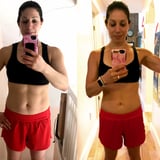
If you've been following my weight-loss journey, you know that I'm big into CrossFit. But after seven months of doing burpees, box jumps, and snatches, I still had a layer of fat that wouldn't budge.
Before
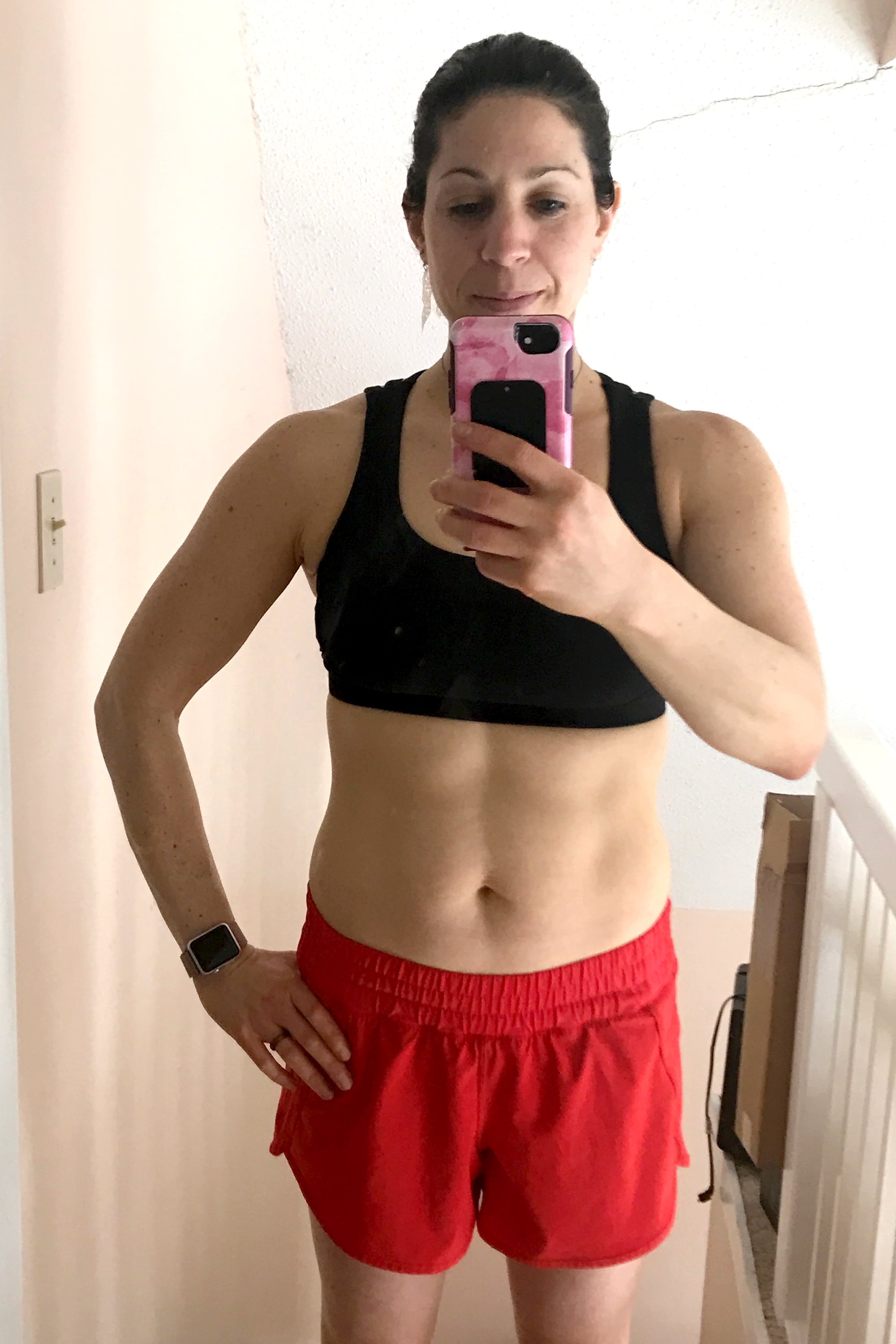
In February of 2017, I started intermittent fasting (IF), specifically the 16:8 method, where you don't eat anything for 16 hours of the day and eat during the other eight. I stopped eating at 8 p.m. and didn't eat again until noon the next day, so basically I skipped breakfast. Some people choose to do other fasting windows, like skipping dinner, but this is what worked best for my schedule.
I was looking for something that would help me get rid of the belly fat I had been holding onto practically my entire life, even though I was once a runner and still follow a strict vegan diet. I extensively researched the different methods of intermittent fasting, and one day, I just decided to go for it.
After only one month of fasting, I started to see my belly fat disappearing, and after three months, I noticed an even bigger difference. I decided to keep going! So here I am, six months later, and I feel amazing.
Curious? Here are the answers to the most common questions people ask me when they find out I do intermittent fasting.
After
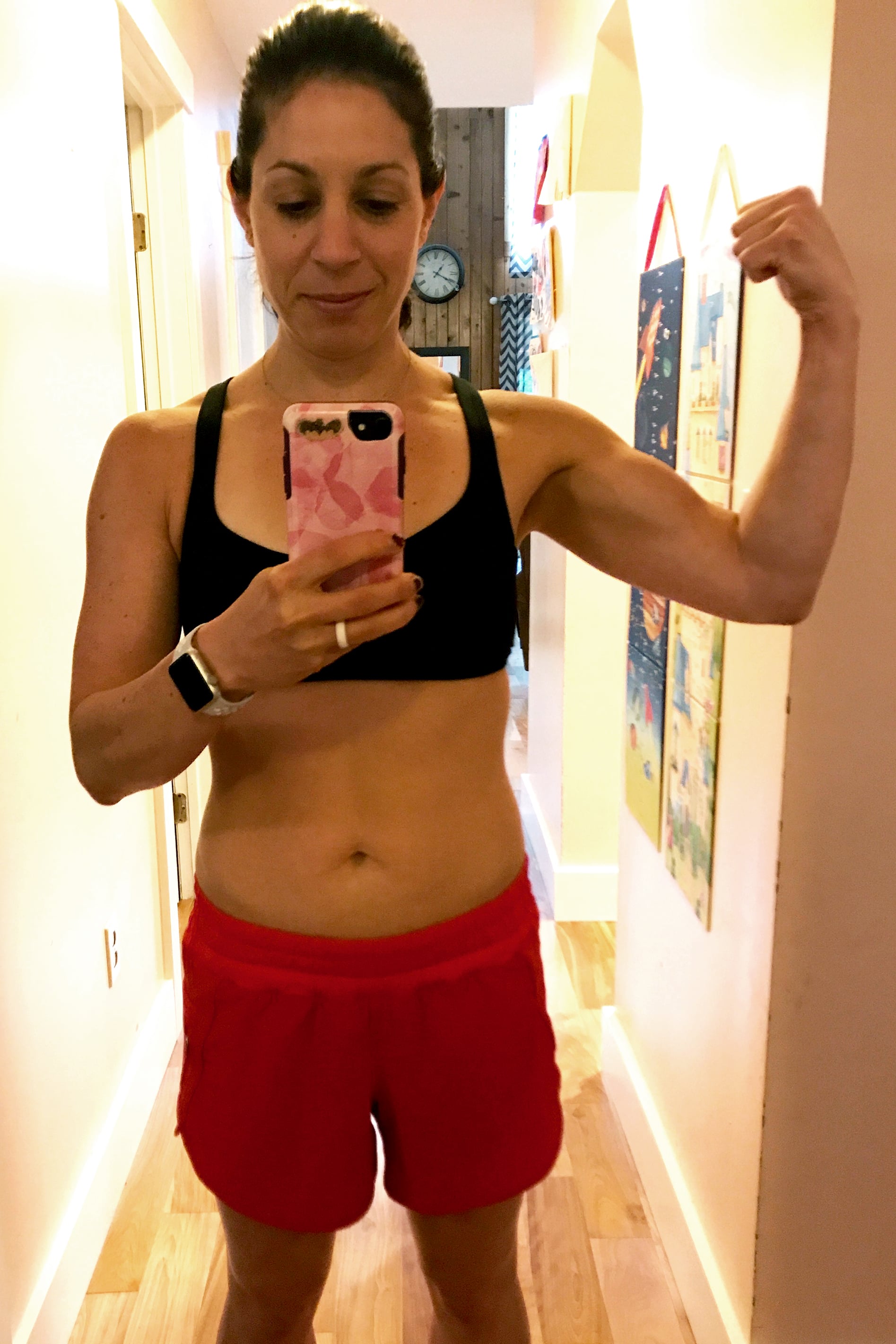
Aren't you starving in the morning? Those first few weeks were tough, as my body was adapting to getting out of the habit of eating in the morning. But after time, the hunger went away. Let me get a little science-y here for a sec. Grehlin is the hunger hormone, which increases appetite and cravings, and when you're fasting, grehlin production decreases.
When I do get a hunger pang first thing in the morning, it goes away when I drink water. Without the constant supply of food that my body used to get when I was eating five or six times a day, my body was now able to tap into the extra energy (fat) that was stored in my body.
How did you function at work in the morning? I thought I'd feel tired, foggy-headed, have a huge headache, or be so distracted by my desire to eat, but I feel the exact opposite. I have laser focus, my thoughts feel clearer, I have tons of energy, and I don't have to waste time thinking about what I'm going to eat, prepping, or cleaning up. I actually feel better than ever.
Did your sugar cravings increase? You'd think not eating all morning would make me want to reach for chocolate the first chance I had, but all I crave are healthy foods. During these last few months, I also cut down on eating refined carbs, ice cream, and chocolate. Those foods sit heavy in my stomach, and feeling crappy after eating them has helped extinguish my cravings for them.
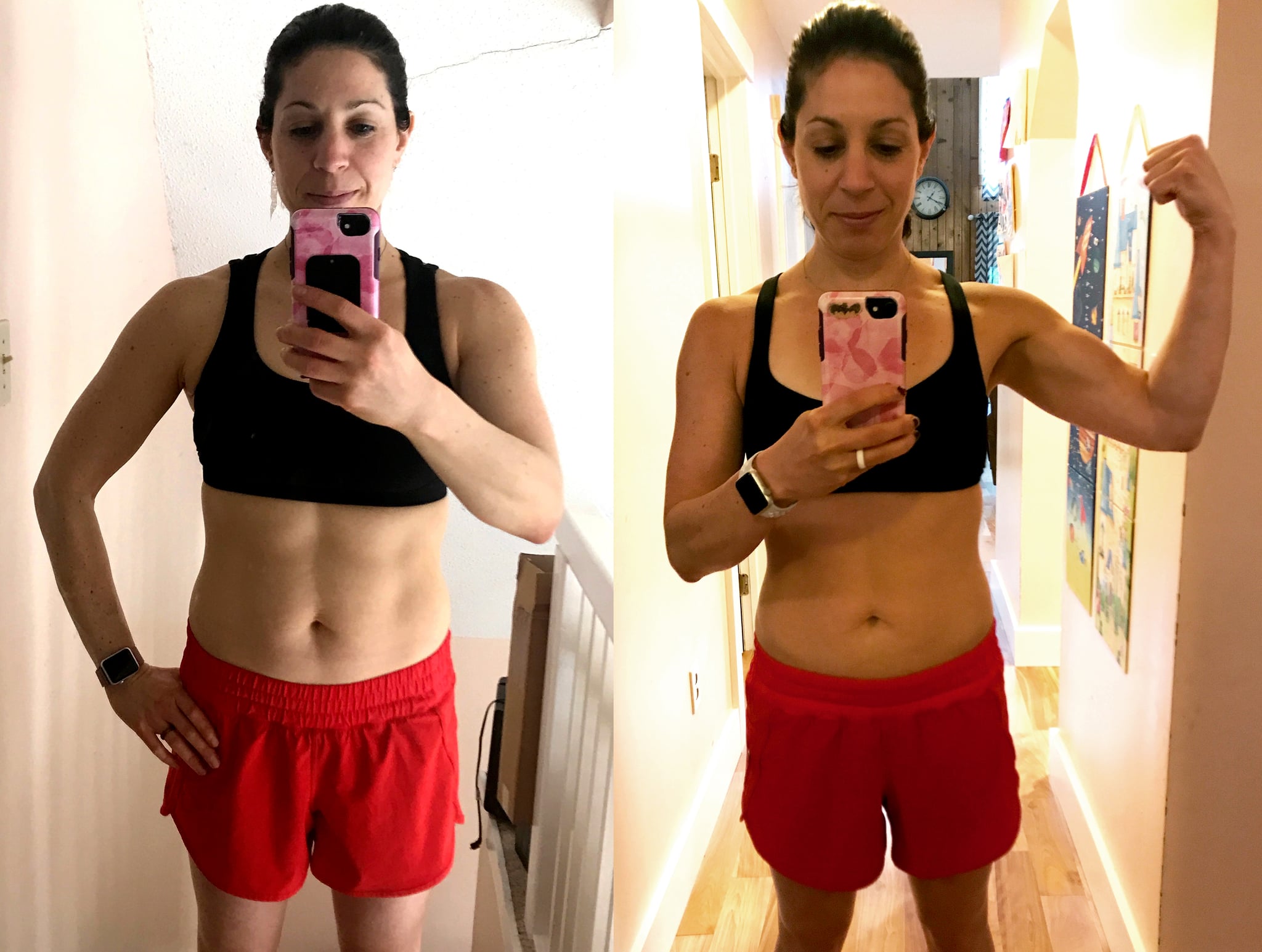
What do you eat during your eight-hour feasting window? I usually break my fast with a handful of raw almonds and a banana or two, followed by a huge salad topped with tofu, beans, avocado, and sunflower seeds, or this roasted tofu, sweet potato, and red pepper dish. Around 3:30 p.m., I have a protein smoothie, a Larabar, or some carrots with guacamole. For dinner, I do a big vegan meal - kale salad with roasted butternut squash and tofu is my fave. Depending on what time I finish dinner, I have some apple slices with salted cashews or a square of this recipe for no-bake brownies. I definitely do not go hungry!
The best thing about IF for me is that I don't count calories and I don't stress about eating too much. The biggest benefit was how IF helped me get a handle on my food addiction. I used to think about eating all day long. I'd eat when I wasn't hungry and would stuff more food in my face when I was already full. It's weird. Part of my brain knew I should stop eating, and the other part just wanted to eat, and that's the part that's been curbed.
Did you lose weight? This is the million dollar question! Actually, I didn't lose a single pound. But it's clear that my body composition has changed, and I've gained muscle and lost body fat - I can see it in my belly and in my face. Since I was continuing to do CrossFit five days a week throughout these six months, I've also noticed more muscle definition in my arms, my quads, and hints of a six-pack budding.
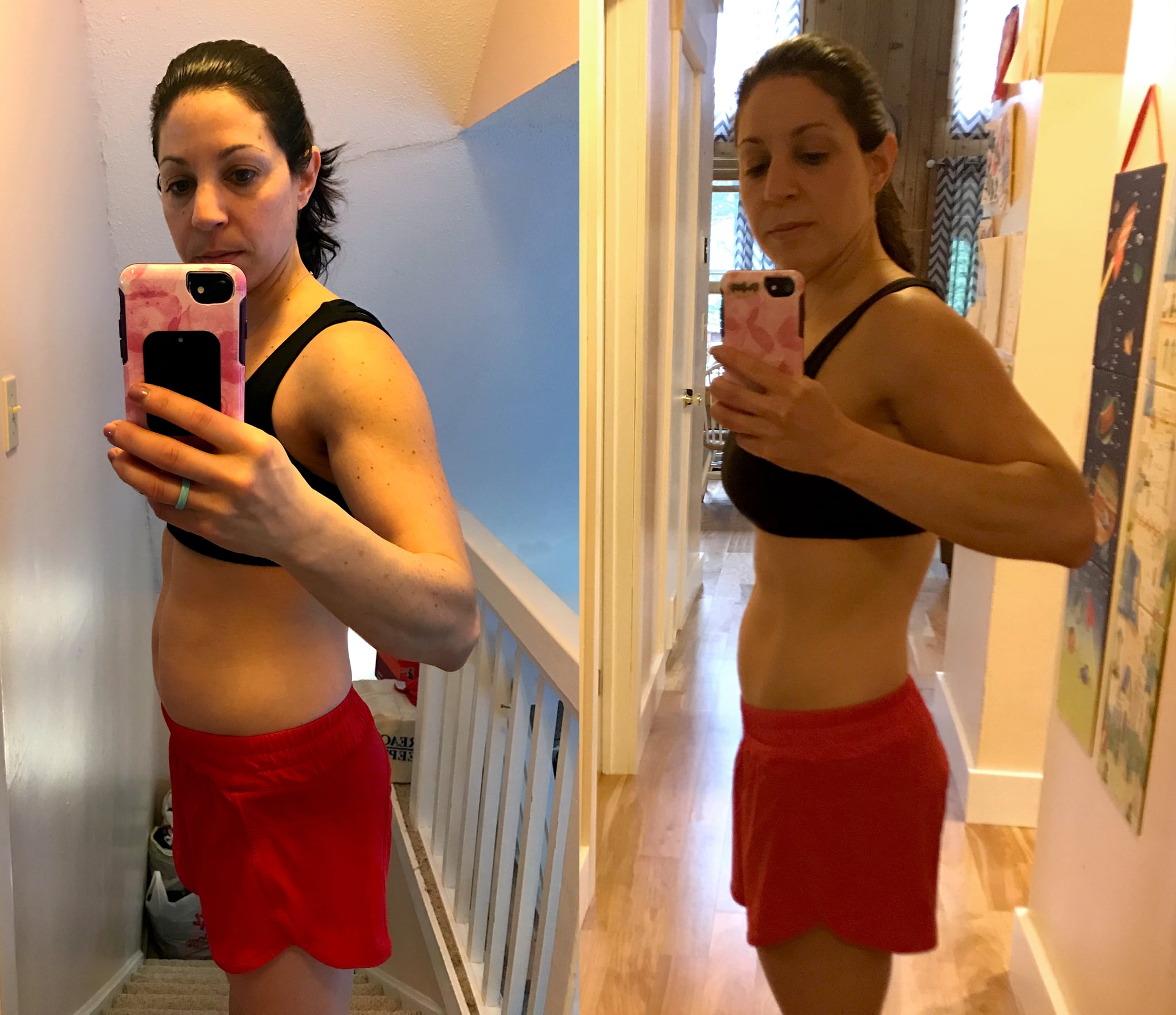
How is your digestion? Amazing, thanks for asking! I've always had an issue with extremely uncomfortable bloating, especially when I eat sugar or overeat, so intermittent fasting basically cured me. Not eating for 16 hours straight gave my body time to digest, and because I was more conscious about what I was putting into my body, I didn't have an issue with overeating or eating too much crap. I'm so thankful for feeling less bloated in the morning and at night. I was ready to go see a gastroenterologist, but now I don't have to!
Do your workouts suffer? I actually feel stronger all around. I am lifting heavier, running faster, and pushing myself harder than I was six months ago. I also haven't gotten sick once (I'm knocking on wood, but I don't need to!). This was one of the benefits aside from weight loss and mental clarity I was excited to see unfold. Some research shows that fasting supports your immune system and can reduce inflammation. I've actually felt less sore, and a shoulder injury I've had for over a decade doesn't bother me anymore. Coincidence?! Fasting allows your body a chance to take a break from digesting so it can put its energy into healing.
Is fasting hard? I'm not going to lie. Some days are tougher than others. Traveling, weekends, holidays, parties, and grueling workouts make me want to eat in the morning, so I haven't been completely strict the entire six months. Some days I shifted my eating window a few hours so I ate from 10 a.m. to 6 p.m., or 1 p.m. to 9 p.m. Some days I said to hell with it! I'm going to the new vegan bakery for breakfast and sharing a cinnamon bun with my son.
Final Thoughts
After recently turning 40, I found my metabolism was slowing down. I like the idea of being able to use IF as a way of eating that I can continue for the rest of my life. I love the freedom of being able to sit down to larger, satisfying meals and eat treats whenever I want to. I don't have to count calories, go low-carb, or exercise two hours a day in order to maintain my weight. I've also read about how fasting may prevent certain diseases like Alzheimer's, Parkinson's, and cancer, all of which are in my family history, so that's another reason I'm inspired to stick with this new lifestyle.
I know what you're thinking. Skipping breakfast is bad. It's the most important meal of the day, and if you don't eat it, your metabolism slows down and you go into starvation mode! That's what we've been told. I'm living proof that all of that isn't true. My intermittent fasting journey has actually inspired three of my friends to start doing IF, too. If I've sparked your interest, do your research and try it for yourself.





0 comments :
Post a Comment